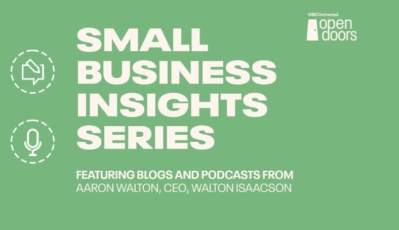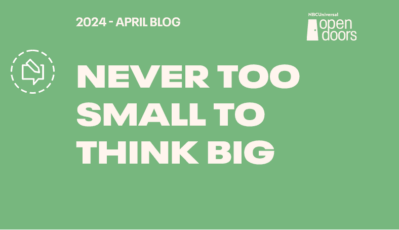FOLLOW US
March 1, 2024 | Authored By

Key Takeaways
- Engage in Possibility-Thinking: Engage actively in possibility-thinking to drive tangible improvements and innovations in your business, going beyond the limits of positive thinking.
- Strengthen Client Relationships for New Opportunities: Strengthen and utilize close client relationships to discover new revenue opportunities by being receptive to their interests in additional services and products.
- Overcome Fear and Invest to Grow: Invest in necessary resources, including human resources, to ensure your business overcomes the trap of underspending due to fear and does not miss out on potential growth opportunities.
Openings are exciting. Whether it’s writing the opening paragraph of a new article or opening a new office, restaurant, or store. They’re filled with optimism and possibility. Openings can also be challenging, as you stare at a blank page, await customers, or take a leap into the unknown. But taking on challenges make us stronger. That’s why I love all the meanings that come to mind when I think about the phrase “Open Doors.”
NBCUniversal created Open Doors to support all small businesses across the country with a special spotlight on minority small businesses. They wanted to provide access to big brand resources and best-in-class expertise. Because when small businesses succeed, communities thrive.
In 2022, WI helped launch the Open Doors website. And this year, NBCUniversal has invited me to host an exciting new podcast called Open Doors: Where Small Businesses Thrive. You won’t want to miss it. Our first guest was the wonderful Latasha Gillespie, Global Head of Diversity, Equity, Inclusion, and Accessibility for Amazon, MGM Studios, Prime Video, and Freevee.
Latasha started out with an essential takeaway. She said any small business owner needs to understand the “why” they are in business. “Because the winds will come,” she explained, “they’ll be persuaded to shift their focus. But they have to remain steadfast. Because if you understand your why, then you can always adjust the what.”
We also talked about failures because, like obstacles, they’re inevitable. But here’s the good news: You’re likely to learn more from your failures than you are from your successes. Failures inspire reflection and change because, as Latasha put it, “the pain is real.” She also shared a rule her team has that’s worth putting into practice: “Every day you should make mistakes. They just shouldn’t be the same ones.”
So, whether it’s about making sure you use “failures” to move you and your business or turning obstacles into opportunities, the important underlying message from both ideas is to keep going and to keep growing.
As you strategically navigate the inevitable twists and turns on your road to success, here are a few easy-to-remember tools to move obstacles aside.
Straight A’s: Attitude, Agility, Adaptability
As I mentioned, when I think about Open Doors, it brings up so many motivating images and ideas. Among them is the entrepreneurial attitude of being open-minded. As some readers may know, I am an alum of Babson College. Their mission is to “prepare and empower entrepreneurial leaders who create, grow, and steward sustainable economic and social value — everywhere.” Over the course of my studies, I recognized that while the power of positive thinking was helpful, it was the power of possibility thinking that really made a tangible difference in my business life. It meant being curious. It also meant getting comfortable with a sometimes uncomfortable relationship with the unknown. As a result, agility and adaptability are enhanced because you’re keeping the door open to change rather than trying to shut it out.
It’s useful to remember that one of the noteworthy characteristics of successful small businesses is agility, often developed because of resilience. It’s not easy, for example, to do more with less, as so many small businesses do — but when your attitude and actions are focused on what’s possible versus what isn’t, small business owners and their teams turn limitations into drivers of creativity and innovation.
Compared to larger organizations, small businesses are likely to have streamlined, close-knit operational structures and less bureaucratic decision-making processes. It’s not unusual for small businesses to pivot more easily than their larger counterparts and adapt in alignment with new trends or with an eye toward innovation.
Adaptability is the only way to not just survive but thrive over time. From rapid technological advancements to economic fluctuations to unpredictable consumer behavior, the world of small business is dynamic. Rigid responses are not an option. Adaptability doesn’t mean losing sight of your “why.” In fact, the contrary. Your reason for being should inspire you to explore a diverse spectrum of strategies and even invent a few in service to your businesses’ values. It’s also useful to think of adaptability in relation to your customer base, whose needs are also always changing. As a small business, you have the advantage of close client relationships. Your customers can open your eyes to new revenue sources based upon their interest in new services and products.
Don’t Fear the F’s: Failure and Finances
I already referenced failure as a catalyst for learning, but it bears underscoring. If you’re not failing, chances are you’re not stretching beyond your comfort zone and that’s unsustainable. From the time we’re children in grade school, we are taught to avoid Fs at all costs. But not all failures are created equal. It’s one thing to make avoidable mistakes and quite another to lean into exploration and innovation, where outcomes are unsure, and failure is part of the process.
Financials are another area that can often induce fear in small business owners. That’s why it’s important you focus on developing a strong financial foundation. The more you understand about your finances, the better your decision-making will be.
Working with an accountant may be more productive than flying solo when it comes to analyzing your cash flow, expenses, and revenue streams. Financial management is a complex aspect of small business ownership, so don’t hesitate to seek out resources and communities, either online or in-person, where you can connect with other entrepreneurs and small business owners and learn about their approaches.
Creating a budget for your business is another useful strategy for feeling more in control of your finances and avoiding over or underspending. While overspending has a worse reputation, there are times when underspending is equally problematic. Underspending out of fear can stunt the growth of your business as needed resources are often put on hold, including decisions about human resources.
Tackling Obstacles Can Be Fun: What’s in Your Way?
A great place to find even more strategies and solutions for turning obstacles into opportunities is on the Open Doors website. It’s a powerful resource to help your small business navigate today’s ever-changing marketing landscape. From Marketing 101 tutorials to Step-by-Step Guides and Worksheets, we’ve made it easier than ever to find the insights, information, and inspiration you need to get to the next level. Remember, if something seems to be in your way, you have a chance to innovate and disrupt the status quo. In other words, you have a chance to open doors.
About Aaron Walton
Aaron Walton is the CEO & Founder of Walton Isaacson, an award-winning advertising and marketing firm. Founded in partnership with Earvin “Magic” Johnson, WI has built innovative business relationships with brands such as Lexus, McDonald’s, American Airlines, NBCUniversal, Amazon, and others. In 2023, Aaron was inducted into the AAF Advertising Hall of Fame.






